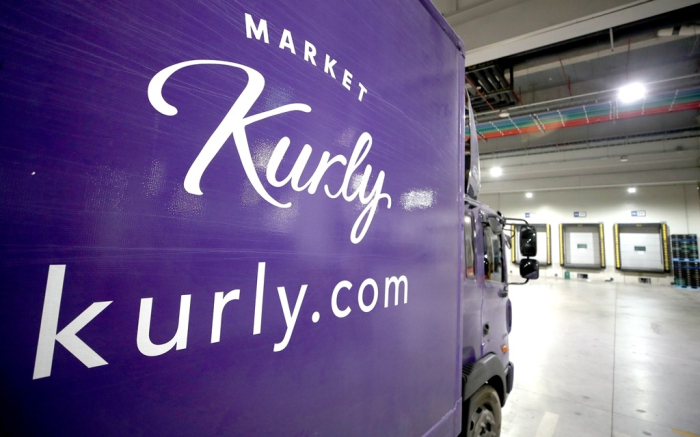Venture capital
SoftBank-backed Tridge in trouble amid Korean startup doom
The more startups close down their businesses, the more venture capitalists go out of business
By Jul 31, 2024 (Gmt+09:00)
5
Min read
Most Read
Samsung steps up AR race with advanced microdisplay for smart glasses


When in S. Korea, it’s a ritual: Foreigners make stops at CU, GS25, 7-Eleven


Maybe Happy Ending: A robot love story that rewrote Broadway playbook


NPS yet to schedule external manager selection; PE firms’ fundraising woes deepen


US auto parts tariffs take effect; Korea avoids heavy hit



Tridge Co., South Korea’s first agricultural product and food trading platform operator invested in by SoftBank Group Corp., is in financial trouble as local startups continue to suffer under the prolonged funding squeeze while increasing risks to the venture capital industry.
Tridge, which had been valued at 3.6 trillion won ($2.6 billion) last year, reported impaired capital -- a balance sheet condition where a company's total capital becomes less than the par value of its capital stock -- at the end of 2023 after logging 115.5 billion won in operating losses in the previous three straight years, according to industry sources on Wednesday.
Seoul-based DS Asset Management Co., which invested 50 billion won in Tridge in 2022, has recently valued its stake in the startup at nil.
The startup faced difficulties raising fresh funds while slashing jobs and changing its business purpose to the data service.
Tridge is not the only company in trouble as more local startups closed their businesses amid the prolonged funding squeeze.
INCREASING BANKRUPTCIES
In the first half, 68 startups that raised money from investors closed down their businesses, according to The VC, a venture capital industry tracker. That compared with a year earlier and the first half of 2022 when 54 startups and 35 companies went out of their businesses, respectively.
“Bankruptcies of not only companies without competitiveness but also firms considered healthy are increasing,” said a venture capital industry source.
Yellow Mobile, South Korea’s No. 2 unicorn – a private company with a corporate value of $1 billion or more – closed down its business in April. The startup, which attracted a total of 260 billion won from investors, struggled due to excessive expansions.
Poolus, the country’s largest ride-sharing platform operator, discontinued its business in March. The startup with more than 1 million users raised a combined 22 billion won from various companies such as Naver Corp. but failed to maintain its business.
LinkShops, a fashion wholesale platform, went out of business although it secured 16.5 billion won from global venture capitalists such as Altos Ventures Management Inc. and Forest Partners Inc.
Startups lowered their valuations to attract fresh funding for survival.
According to the Ministry of SMEs and Startups, 20.7% of companies that raised money from investors in the first quarter for the second straight year saw declines in their corporate values. Early stage investments by venture capitalists fell 6.6% to 572.7 billion won in the January-March period from a year earlier.

DOOM EXTENDS TO VENTURE CAPITAL INDUSTRY
The downfall of the startup industry is also hitting the local venture capital sector with small and medium-sized investors on the brink of failure.
Six venture capitalists including the South Korean unit of IDG Capital closed down their businesses in the first half. Four venture capitalists went out of their businesses last year.
The increasing shutdown indicates the venture capitalist industry is facing more troubles as financial institutions usually spend more on investments in the first half, industry sources said.
“The industry is likely to suffer a series of closures in the second half,” said another venture capital sector source.
Five venture capitalists have already been warned by financial regulators as their capital was impaired hurting their management soundness.
Venture capitalists are trying to minimize losses from failed startups with some attempting to sell stakes in healthy companies with those of troubled ones.
“Few venture capitalists do not have troubled startups in their portfolios,” said a major investment company’s head. “Many venture capitalists cannot afford to pay attention to new investments as they are trying to minimize losses from those troubled companies.”
FEWER IPOS
The venture capital industry struggled to exit from investments in startups as fewer of them succeeded in listing.
According to the Korea Venture Capital Association, 26 companies invested by venture capitalists were listed on the country’s tech-heavy Kosdaq in the first half, accounting for 51% of the total initial public offerings of 51 firms including those through mergers with special purpose acquisition companies (SPACs).
Venture capitalist-backs startup IPOs on the junior bourse made up 63.9% in 2020, 62% in 2021, 59.8% in 2022 and 54.4% in 2023.
The declines came as stock market authorities such as the Korea Exchange (KRX) took tougher stances on startup listings after investors complained about some companies such as Fadu Inc., the first unicorn in the country’s semiconductor sector. Its first public earnings disclosure after its listing shocked the market with poor results – in stark contrast to its earlier rosy projections.
Twenty-seven companies voluntarily withdrew their IPO plans or failed to get approval as the KRX took tougher stances on startup listings.
Overvaluations on startups also put brakes on their listings, industry sources said. Their valuations were excessively estimated in 2020-2021 when the global market enjoyed abundant liquidity, according to the sources.
Venture capitalists focused on potential sales growth at that time as the increasing sales despite losses could raise startup valuations.
That raised target valuations for returns from the investments, making startups harder to seek IPOs, industry sources said.
The listings of smaller startups became more difficult after the IPOs of unicorns such as Kurly Inc., the leading domestic food delivery platform, failed due to valuation issues, they added.

More venture capitalists looked for the private-equity secondary market -- the buying and selling of pre-existing investor commitments to private equity and other alternative investment funds – as it became harder to exit with profits from listing startups.
The industry established 552.6 billion won in 25 new private-equity secondaries, which aim to make profits through buying stakes in existing venture funds in the first half, similar to 554.9 billion won in 26 secondaries last year.
Those secondaries became larger with a total of some exceeding 100 billion won.
“Fortunately, the secondaries are becoming popular amid the tighter IPO market,” said the other venture capitalist source.
Write to Seok-Cheol Choi, Jeong-Cheol Bae, Eun-Yi Ko and Joo-Wan Kim at dolsoi@hankyung.com
Jongwoo Cheon edited this article.
More to Read
-
 Korean startupsDisgruntled investors accuse Fadu of blowing smoke
Korean startupsDisgruntled investors accuse Fadu of blowing smokeNov 14, 2023 (Gmt+09:00)
4 Min read -
 Venture capitalKorean startups feel bite of funding drought in H1
Venture capitalKorean startups feel bite of funding drought in H1Jul 07, 2023 (Gmt+09:00)
3 Min read -

-
 Korean startupsSoftBank-backed Tridge becomes South Korea’s first agriculture unicorn
Korean startupsSoftBank-backed Tridge becomes South Korea’s first agriculture unicornAug 25, 2022 (Gmt+09:00)
1 Min read
Comment 0
LOG IN


